QuestionHi,
I'm trying to do some research before buying a tortoise and see if it is the right pet for me. I'm an adult that works long hours, so I have limited time to play with my pet, maybe an hour a day or so.
I would like to ask you a few general questions:
1- Which species should I buy that would grow the least?
2- I'm planning to buy this turtle house:
http://www.petco.com/product/106684/Zoo-Med-Tortoise-House.aspx
Do you think it is appropriate?
3- I live in Florida (hot weather) all year 'round and I'm planning to keep my pet house on the balcony (I may bring it indoors if the temperature drops). Is that OK?
4- How can I tell whether it is male or female?
5- Is a UV light strictly necessary?
6- If I go on vacation, would it be unreasonable to ask a neighbor to feed it and take care of it while I'm gone?
7- Is a tortoise a low maintenance type of pet (compared with others)? How much do I need to spend approximately a year?
8- Expecting the tortoise to outlive me, how should I prepare for continuous care of the tortoise after I die?
Also, if you can give me some general information about how to care for my pet, I would appreciate it.
Thanks,
Gabriela
AnswerHi Gabriela,
Sorry I didn't get back to you sooner--I was having internet problems. Tortoises are great pets, but they are not domesticated animals, and while they can become somewhat tame and will recognize you, they aren't really pets that you "play" with the way you would a dog or cat. Too much handling can be stressful for them, so the best way to enjoy a tortoise is by observation. Anyway, let's go through your questions--
1) There are a few species that are fairly easy to obtain captive bred and don't grow too large. Hermann's tortoise, Russian tortoise, Greek tortoise, marginated tortoise are probably the most common species. However, keep in mind that tortoises do need space and even a fairly small one should be given plenty of room I highly recommend not buying a tortoise from a pet store or online dealer and instead buying a hatchling or juvenile from a private hobby breeder. You'll end up with a healthier tortoise from someone who really cares about their breeding adults.
2) IMO, the ZooMed house is too small for an adult tortoise of any species except for limited periods of time. It just doesn't allow for adequate exercise. Two of the houses put together would be OK, but expensive. It would be better to build something bigger yourself, in the 4 x 6 (or larger) range. The other issue with the ZooMed house is that it won't hold up to moisture over time, so would have to be sealed or lined.
3) Outside is much better than inside. Much healthier for the tortoise. You do have to make sure that there is adequate shade all day long, so the tortoise doesn't overheat. Otherwise, the tortoise could easily stay outside most of the year where you live.
4) You can only sex mature tortoises. Immature ones all look female. Generally speaking, a female's tale will be short and stubby, and a male's tail will be longer and tapered. In some species, there are other characteristics (shell concavity in males, etc.), but tail differences are a reliable indicator. Personality-wise, sex doesn't matter much. It does become an issue if you have multiple tortoises.
5) You mean UVB, not UV. UVB allows a tortoise to properly metabolize calcium, so a good UVB bulb is an absolute necessity for a tortoise that is indoors. You would not need one for yours when outside, but if it needed to be inside for more than a day or two, you should have one in the indoor setup. I recommend ZooMed Powersun for heat and UVB, and that's the only UVB bulb I recommend because many bulbs that claim to provide adequate amounts of UVB are unreliable.
6) If you're only gone for a few days, it would be safe to leave the tortoise on its own (indoors). You can put lights on a timer, and feed heavily before you leave. Tortoises don't have to eat daily, although they like it. For longer periods, having someone come in to feed, change water, etc. is fine. It's easily to bag up food and leave int the refrigerator. They are very easy-care in that regard.
7) They are low-maintenance in terms of not having requirements such as walks, grooming, etc. They do need attention in terms of proper setup and diet. I can't really give you a number in terms of costs because it can vary quite a bit. The biggest expense is the initial cost for the enclosure, substrate, etc., plus UVB bulb. Food costs can vary quite a bit. The largest possible expense is veterinary bills, but if you have a good setup and provide proper care you may never need to visit a vet. In the past 10 years I've had a number of tortoises from hatchling to adult, including quite a few rescues, and I've only needed the vet a couple of times. Good care = healthy tortoise!
8) You can either make sure the tortoise will go to someone in your family or circle of friends who will take good care of it, or designate a rescue to take it.
As far as general care goes, to some extent it depends on the species. All the species I mentioned above are herbivores, which means they should be fed a variety of leafy greens and weeds, with no fruit, veggies, or pellets. The most important aspects of keeping tortoises are plenty of room, a good, natural substrate with moisture (dehydration can cause serious health issues, so moisture in the enclosure is important), proper basking/UVB, and a good varied diet. Don't feed the same thing all the time. It's very worthwhile to do research on diet so you have a list of foods to provide. My other recommendation is to not take advice from pet stores. They just don't have experience on tortoises and over the years most of what I've heard has been really bad. For example, I've had countless people tell me that they bought Russian tortoises from pet stores that told them they were captive bred and 6 to 12 months old, when in fact what they bought were wild caught adults. Anyone who knows Russian tortoises would be able to tell the difference between a hatchling/juvenile and adult, because the difference is glaringly obvious, yet this error happens over and over again. So if a pet store tells you something, just assume it's not correct unless you can confirm it from a reliable source.
If I can help you with more information, just ask. I can give you more specifics on species if you have an idea of what you're most interested in. I keep Russian, Hermann's, and marginated, but not Greek, although as I mentioned care is similar. There are some size and appearance differences, though.

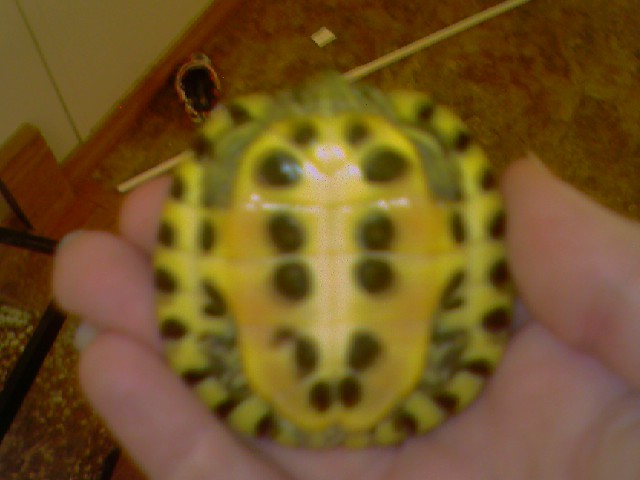 species of turtle
Question
belly of turtle
I was given a turtle from a fr
species of turtle
Question
belly of turtle
I was given a turtle from a fr
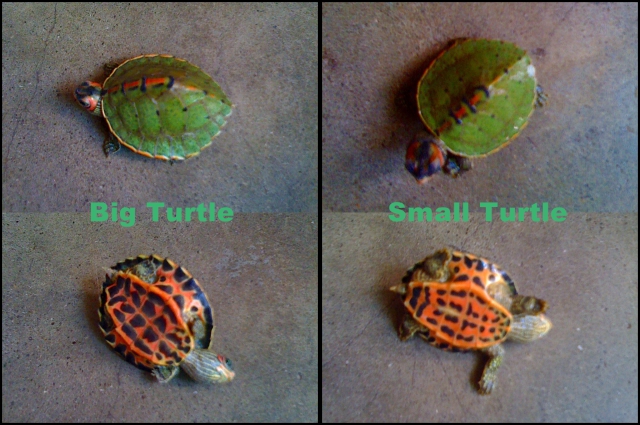 Turtle Species
Question
My Turtles
Hello, I bought two small ha
Turtle Species
Question
My Turtles
Hello, I bought two small ha
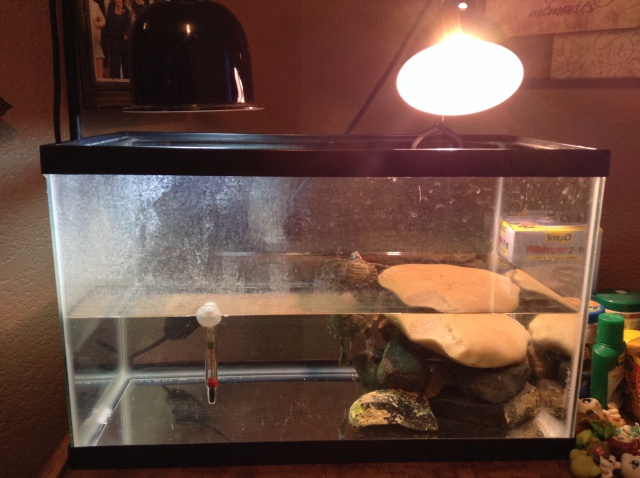 Red Eared slider in shock
QuestionQUESTION: I just cleaned my turtle cage today w
Red Eared slider in shock
QuestionQUESTION: I just cleaned my turtle cage today w
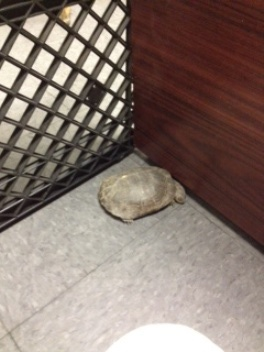 turtle id
Question
turtle id
hello, i would like to know w
turtle id
Question
turtle id
hello, i would like to know w
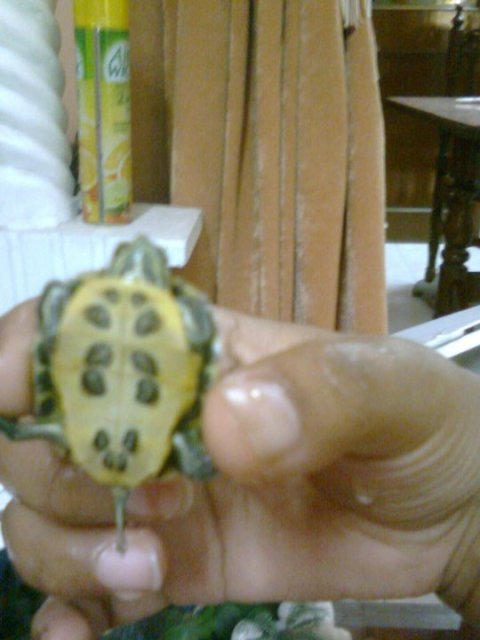 turles pregnancy...
Question
gangster
i have bought a red eared slider turt
turles pregnancy...
Question
gangster
i have bought a red eared slider turt